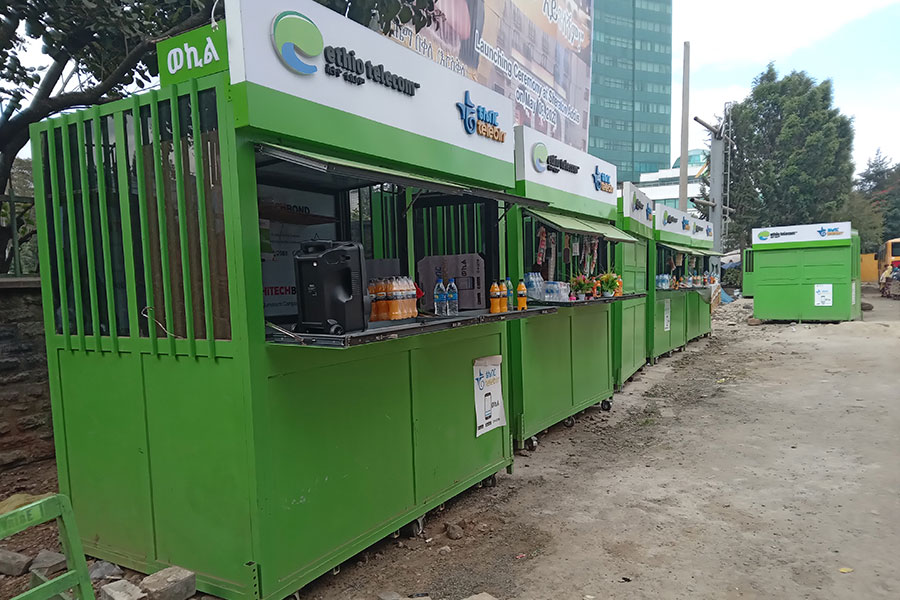
Radar | Oct 23,2023
Mimi Legesse, a 32-year-old woman with a hearing impairment, began her entrepreneurial journey during her pregnancy, making bags and hats out of crochet, but her intended market failed to materialise.
After giving birth, she went back to school to complete her high school and decided to turn her skills into a business, which led to the birth of Teki Paper Bags Plc.
Teki is an Amharic word that comes from the word "Metekat," which means to replace. Teki Paper Bags was established as a social enterprise with the main aim of building a plastic-free Ethiopia while creating sustainable employment for women with hearing impairments.
Established in 2016, Teki produces up to 500 paper bags a day with Garden of Coffee, Sole Rebels, Hyatt Regency Hotel, Marriott Executive Hotel and CGCC Group among its customers.
Since its inception, the company has produced around 972,000 paper bags. When the company came to life, it had only two initial clients, which has now grown to 70, evidence that many Ethiopian businesses have joined the green bandwagon.
In general, the demand for paper in Ethiopia has seen a sharp increase with the growth of population, urbanisation, education and social and economic activities.
The annual demand for the paper reached 219,840tn two years ago, according to a survey conducted by the Chemicals & Construction Inputs Industry Development Institute.
Out of the total demand, 62pc of the paper in the country is covered by local paper manufacturers, while the rest is fulfilled by import.
In parallel with the growing demand, the amount of paper waste generated has also increased dramatically.
Out of a sample of 8,400tn of solid waste collected in Addis Abeba that was collected a decade ago, 2,035tn was contributed by paper and paper products, according to the IGNIS research project.
Some years ago, waste was collected from households, factories and organisations by individuals informally.
To formalise the waste collection system, in 2010, the City Administration organised youth in micro and small enterprises to collect the waste produced from residential areas. Private waste collectors were also made to gather the waste produced by commercial organisations.
An employee binding the recycled paper with a leather cover.
Currently, 74 associations are involved in collecting waste through 6,400 operators and 130 medium trucks. They dump it at communal garbage containers.
Municipal district vehicles then pick up the waste from the containers and drop it off at landfills located in their respective areas.
But recently the government started a pilot project in Bole District to outsource the transportation of the waste to the final dumping site to private operators, according to Kassahun Tsegaye, the director of Addis Abeba Solid Waste Recycling & Reuse Project.
There are more than 40 private garbage collectors that transport commercial waste to landfills using their own vehicles.
Despite the effort of the government to enhance its recycling programmes, there is still a significant gap to be filled in handling landfill waste, Kassahun added.
Penda Paper Recycling is one of the companies that signed an agreement with the municipality to collect waste paper and cardboard from micro and small enterprises.
Established in 2015, Penda collected paper from 7,000 SMEs and different offices and recycles waste paper in order to provide pulp to local paper mills.
Waste paper recycling involves the process of mixing used paper with water and chemicals to break it down. This mixture is then chopped up and heated to break it down further into strands of cellulose called pulp or slurry.
The pulp then is strained through screens that remove any glue or plastic that may still be in the mixture. Finally, it is cleaned, de-inked, bleached, mixed with water and then turned into new recycled paper or different paper products.
The Global Waste Paper Recycling Market was valued at 251.7 billion dollars in 2018 and is expected to register a compound annual growth rate of 4.4pc between 2019 and 2025, according to Grand View Research.
Paper and paper products are expected to become widely used packaging materials globally, shortly surpassing plastic bags, because of their environmental friendliness, according to researchers based at Columbia University.
Over the past few years in Ethiopia, recycling has increased because of the development of different regulations that led to a large production of feedstock that is recycled into pulp, jumbo roll tissue papers and paper sheets.
Client's paper bags at Teki Paper Bags Plc.
In recent years, the country is witnessing SMEs and entrepreneurs investing in creative product niches and manufacturing technologies. It is observed that far-sighted players have already found profitable openings in markets.
Felek is a notebook brand under Savannah Printing Press Plc, which started recycling after witnessing the increased amount of wasted paper from its printing press.
"We use a historical Coptic stitching method to produce hand-made paper," said Sulieman Dawit, managing and creative director of the company. "We use customizable leather or recycled jerrycans to produce covers for the notebooks."
After launching Felek Notebooks & Journal in 2016, the company found it challenging to penetrate the market because of a prejudicial view that questioned the quality standards and assumed that recycled products are more expensive, according to the director.
"The prices of the recycled commodities have to compete with their virgin counterparts made straight out of the wood pulp," Suleiman said.
The other main challenge of these companies is getting the sheets of the paper roll for their products.
Teki used to get sheets of paper rolls from a local manufacturing company that met the quality criteria set out by the company.
But after the local firm shutdown, they are currently importing semi-recycled paper roll sheets from abroad.
"This has been a great pain for the company due to the high cost to import the materials,” says Mimi.
Ethio-Eco Papers, another SME, utilises plants like "Enset Kacha", "Enset Koba", "Annas Ketel", "Teff Ched", "Sende Ageda", and sometimes papyrus to produce paper.
Employees of the company use hand-stitching with chemical-free processes to turn the raw materials into a pulp and develop product lines like postcards, bookmarks, pads, journal books, photo frames, photo album and customised paper bags.
Tesfaye Mekonnen, managing director of Ethio-Eco Papers, which has been in business for ten years, says that the company went through various ups and downs.
"I've witnessed a lot of changes in the market," he said. "We now have big clients like Hyatt Regency Hotel that used our postcards for the last New Year."
Hyatt Regency Hotel, the eighth international franchise hotel to join the hospitality industry in the capital in December 2018, uses paper bags, gift cards, photo boxes and notebooks that are made of recycled paper. It sources the products from Teki, Ethio-Eco and Felek.
During the Ethiopian New Year, which was marked in September, Hyatt Regency distributed a postcard made by Ethio-Eco to its clients and guests.
"I remember for a fact five organisations appreciated the New Year postcards," said Heddo Siebs, general manager of Hyatt Regency.
Ethio-Eco is also working on diversifying lines of products triggered by increased competition in the market, according to the manager.
"Awareness has built consumer demand for greener products," said Tesfaye, who also plans to use cotton to make 100pc cotton paper by importing machinery and taking training from abroad.
Atlaw Alemu (PhD), an environmental economist, says that the success of recycling will not depend on how much landfill space is saved but on whether or not recycling makes economic sense.
He emphasised the fact that the recycling industry might thrive by aligning itself with the local economy, assisted by the corporate managers and government policymakers working together as partners rather than individual adversaries.
"The simple economics of supply and demand couldn’t fully capture the value of building the need for recyclables," he said. "When compared with their virgin counterparts, recycled paper products provide several intangible but increasingly crucial business benefits."
From a marketing perspective, more prominent industries should support the recyclers by investing in their products, which in turn helps them win new customers and retain old ones besides reassessing procurement policies to determine if there are subtle prejudices against using recycled products, according to the expert.
"Investment in recycled products also means more competition and will inevitably force design innovations and new technologies that can further lower production costs," he said.
PUBLISHED ON
Nov 02,2019 [ VOL
20 , NO
1018]

Radar | Oct 23,2023

My Opinion | Feb 25,2023

Radar | Sep 28,2019

Commentaries | Apr 17,2021

Fortune News | Oct 24,2020

Radar | Sep 05,2022

Life Matters | Apr 02,2022

Fortune News | Jul 03,2024

Commentaries | Dec 26,2020

Radar | Nov 30,2019

Dec 22 , 2024 . By TIZITA SHEWAFERAW
Charged with transforming colossal state-owned enterprises into modern and competitiv...

Aug 18 , 2024 . By AKSAH ITALO
Although predictable Yonas Zerihun's job in the ride-hailing service is not immune to...

Jul 28 , 2024 . By TIZITA SHEWAFERAW
Unhabitual, perhaps too many, Samuel Gebreyohannes, 38, used to occasionally enjoy a couple of beers at breakfast. However, he recently swit...

Jul 13 , 2024 . By AKSAH ITALO
Investors who rely on tractors, trucks, and field vehicles for commuting, transporting commodities, and f...

Jul 5 , 2025
Six years ago, Ethiopia was the darling of international liberal commentators. A year...

Jun 28 , 2025
Meseret Damtie, the assertive auditor general, has never been shy about naming names...

Jun 21 , 2025
A well-worn adage says, “Budget is not destiny, but it is direction.” Examining t...

Jun 14 , 2025
Yet again, the Horn of Africa is bracing for trouble. A region already frayed by wars...